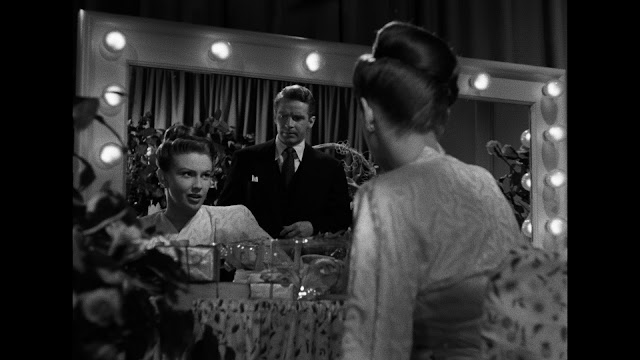Despite the title, there are no vampires in this movie. It's not even horror. Instead, El vampiro negro/The Black Vampire (1953) is a brilliant Argentine film noir adaptation of Fritz Lang's M (1931). It takes the original story of a whistling serial killer who roams the streets looking for young girls to kill and adds some new characters—most notably some interesting female characters—and transports the viewer to 1950s Buenos Aires, Argentina.
Directed by Román Viñoly Barreto, El vampiro negro stars Olga Zubarry as Amalia, a beautiful cabaret singer and single mom who works hard to keep her daughter in boarding school. One night Amalia witnesses a mysterious man dump the body of a young girl. The man in question is Teodoro (Nathán Pinzón)—an English professor by day and a deranged serial killer by night. Teodoro feels isolated by society and has never had a relationship with a woman.. He pays Amalia's friend Cora (Nelly Panizza) for the opportunity to visit her without any sort of sexual touch. In return, Cora takes his money and humiliates him for her own enjoyment. Teodoro takes out his sexual frustrations by stalking for new prey. It's suggested that he's only attracted to adult women and that he seeks out young girls solely because they're easy prey to kill.
The other prominent male figure in the story, Dr. Bernard (Roberto Escalada), is investigating the case of the serial killer dubbed "the black vampire." Bernard seeks out Amalia for information about what she saw that fateful night. Dr. Bernard and Teodoro are not very different from each other. Like Teodoro, Dr. Bernard is sexually frustrated and while devoted to his invalid wife he seeks an affair with Amalia who rejects him. Both men channel their frustrations on either side of the law. As Teodoro continues to kill, the community is both terrorized and brought to action to capture "the black vampire."
El vampiro negro/The Black Vampire (1953) is a thrilling film noir. It comes out of the golden age of Argentine cinema and is clearly influenced not only by early German cinema but also American film noir. The story is told in one long flashback sequence and employs many other film noir elements including its use of light and shadow, most notably in the sequences where the killer is being chased through the sewers. The film explores themes of isolation and humiliation as well as social responsibility and the importance of community. While it has the same framework as M (1931), it's a loose adaptation with plenty of new elements that make it seem more like an original story.
Olga Zubarry really carries the movie as the story's main protagonist. While her performance was at times a bit over the top, Zubarry's character Amalia is the emotional core of the film and she adeptly guides us through the story and always keeps us aware of what is truly at stake. I was most captivated by Nathán Pinzón who is a dead ringer for Peter Lorre who was in the original film. He has the same wide set eyes and a countenance that expresses sadness with a hint of danger. According to film historian Fernando Martin Peña, Pinzón was a great admired Lorre and modeled his own acting style after him.
El vampiro negro (1953) is available in a beautiful Blu-ray and DVD deluxe set from Flicker Alley. The film was rediscovered and restored by the Film Noir Foundation and the UCLA Film and Television Archive. They were also responsible for bringing to light another wonderful Argentine film noir
Los Tallos Amargos/The Bitter Stems (1956) which I highly reommend you watch if you haven't already.
The Flicker Alley set includes the restored version of El vampiro negro on two discs as well as a booklet and reversible cover. The extras include an introduction by Eddie Muller, a documentary about the three adaptations of M, an interview with director Román Viñoly Barreto's son Daniel Viñoly, an essay by Imogen Sara Smith as well as audio commentary by Fernando Martin Peña. For those Spanish speakers out there, the discs also include Spanish subtitles. I always prefer to watch Spanish movies with Spanish subtitles so I really appreciated having this option!
El vampiro negro (1953) is available wherever Flicker Alley discs are sold.
Amazon — Barnes and Noble — Deep Discount — Flicker Alley
Thank you to Flicker Alley for sending me a copy of El vampiro negro for review.
Watch me discuss this film and more on the latest episode of my Classic Movie Roundup on YouTube.












